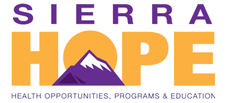Behind the Scenes of HIV Care: A Nurse's Journey with Sierra Hope’s Bonnie Nordby
Bonnie Nordby
Nurse Case Manager/Program Manager
Sierra Hope HIV Care program
In our last newsletter, we promised to have Bonnie give us some insights into the Sierra Hope HIV Care Program. April 1 marked the start of a new 5-year contract for our Ryan White HIV Care Program; and we thought it perfect timing to have a Q&A with Bonnie to get her insights on Sierra Hope's HIV Care program that she leads to provide insights for you, our supportive community!
Q: What is your role at Sierra Hope and what led you to this career path?
I have been an RN and Public Health Nurse for many years with experience in Communicable Disease, Preventive Health Care for the Aging, Chronic Disease Self-Management Workshop Programs, inpatient, and day program adult psychiatric nursing leading and co-leading patient therapy and educational groups. I grew up in Calaveras County and worked here at times in my career, so I know the culture and challenges of living in the counties Sierra HOPE serves.
Today, I serve as the Nurse Case Manager and Program Manager for the Ryan White HIV Care Program. I talk to or visit our clients on a regular basis. As a nurse I review their health history and HIV related care. Many of our older clients have multiple chronic health conditions along with HIV. I develop individualized care plans for clients each year and as needed. I can also address psychosocial issues including enrolling eligible clients into the AIDS Drug Assistance Program (ADAP) so they can receive funding for their HIV medications. I also can enroll eligible clients into the Housing Opportunity for Persons with AIDS (HOPWA) program where they can get short term emergency assistance with rent, mortgage and utility expenses. My role as Nurse Case Manager allows me to combine my passion for nursing with my desire to serve our community.
Q: What do you find the most rewarding about your work?
The most rewarding aspect of my work is undoubtedly the connections I build with our clients. Each interaction is an opportunity to provide support, comfort, and hope. Knowing that I can make a positive difference in someone's life, especially during challenging times, is incredibly fulfilling. And having a supportive boss like Jerry Cadotte only enhances the experience.
Q: What do you find the most challenging about your work?
One of the most challenging aspects of my work is navigating the administrative side, particularly the documentation requirements and data input platforms for our programs. Currently, we're undergoing a transition to a new system called HIV Care Connect, which aims to streamline information sharing among HIV clinics and programs like Sierra HOPE. Additionally, as a nurse, connecting our clients with local healthcare providers can be challenging, especially in rural areas. I am planning to bring in speakers who can provide educational updates for physicians, family nurse practitioners, and physician's assistants on HIV care in our local counties to ensure our clients receive the best possible care.
Q: Tell us a little about the clients you serve and what the services you provide mean to them and their quality of life?
Our clients come from diverse backgrounds, representing various genders and sexual orientations. Whether they've been living with HIV for years or are newly diagnosed, our goal is to provide tailored support to meet their individual needs. For many of our low-income clients, programs like HOPWA can mean the difference between stable housing and homelessness. ADAP serves those who are not on Medi-Cal so the high cost of HIV medication is not a barrier to their taking medication. We have a Nutritional Assistance Program (NAP) with a $100 monthly grocery card they can receive, and clients can request gas voucher cards to help with the cost of driving to a medical appointment. All of these services contribute to improving our clients' quality of life, addressing their practical needs while they focus on their health.
Q: What are 2-3 key pieces of information that you think everyone should know about HIV/AIDS and don't, and/or what are the most common misconceptions you'd like to see corrected?
There are a few key pieces of information about HIV/AIDS that I believe everyone should be aware of. Firstly, with consistent medication, individuals living with HIV can no longer transmit the virus sexually or otherwise. Secondly, modern HIV medications have minimal side effects and are often taken just once daily, making treatment more manageable than ever. Lastly, if people get tested for HIV regularly and are treated early, they will not develop the immune system problems of undiagnosed HIV and will not develop AIDS.
It's important to dispel misconceptions surrounding HIV/AIDS, particularly the outdated belief that it only affects the gay community. HIV/AIDS doesn't discriminate based on sexual orientation or gender—it can impact anyone, and it's essential that we approach it with empathy, understanding, and accurate information.
Nurse Case Manager/Program Manager
Sierra Hope HIV Care program
In our last newsletter, we promised to have Bonnie give us some insights into the Sierra Hope HIV Care Program. April 1 marked the start of a new 5-year contract for our Ryan White HIV Care Program; and we thought it perfect timing to have a Q&A with Bonnie to get her insights on Sierra Hope's HIV Care program that she leads to provide insights for you, our supportive community!
Q: What is your role at Sierra Hope and what led you to this career path?
I have been an RN and Public Health Nurse for many years with experience in Communicable Disease, Preventive Health Care for the Aging, Chronic Disease Self-Management Workshop Programs, inpatient, and day program adult psychiatric nursing leading and co-leading patient therapy and educational groups. I grew up in Calaveras County and worked here at times in my career, so I know the culture and challenges of living in the counties Sierra HOPE serves.
Today, I serve as the Nurse Case Manager and Program Manager for the Ryan White HIV Care Program. I talk to or visit our clients on a regular basis. As a nurse I review their health history and HIV related care. Many of our older clients have multiple chronic health conditions along with HIV. I develop individualized care plans for clients each year and as needed. I can also address psychosocial issues including enrolling eligible clients into the AIDS Drug Assistance Program (ADAP) so they can receive funding for their HIV medications. I also can enroll eligible clients into the Housing Opportunity for Persons with AIDS (HOPWA) program where they can get short term emergency assistance with rent, mortgage and utility expenses. My role as Nurse Case Manager allows me to combine my passion for nursing with my desire to serve our community.
Q: What do you find the most rewarding about your work?
The most rewarding aspect of my work is undoubtedly the connections I build with our clients. Each interaction is an opportunity to provide support, comfort, and hope. Knowing that I can make a positive difference in someone's life, especially during challenging times, is incredibly fulfilling. And having a supportive boss like Jerry Cadotte only enhances the experience.
Q: What do you find the most challenging about your work?
One of the most challenging aspects of my work is navigating the administrative side, particularly the documentation requirements and data input platforms for our programs. Currently, we're undergoing a transition to a new system called HIV Care Connect, which aims to streamline information sharing among HIV clinics and programs like Sierra HOPE. Additionally, as a nurse, connecting our clients with local healthcare providers can be challenging, especially in rural areas. I am planning to bring in speakers who can provide educational updates for physicians, family nurse practitioners, and physician's assistants on HIV care in our local counties to ensure our clients receive the best possible care.
Q: Tell us a little about the clients you serve and what the services you provide mean to them and their quality of life?
Our clients come from diverse backgrounds, representing various genders and sexual orientations. Whether they've been living with HIV for years or are newly diagnosed, our goal is to provide tailored support to meet their individual needs. For many of our low-income clients, programs like HOPWA can mean the difference between stable housing and homelessness. ADAP serves those who are not on Medi-Cal so the high cost of HIV medication is not a barrier to their taking medication. We have a Nutritional Assistance Program (NAP) with a $100 monthly grocery card they can receive, and clients can request gas voucher cards to help with the cost of driving to a medical appointment. All of these services contribute to improving our clients' quality of life, addressing their practical needs while they focus on their health.
Q: What are 2-3 key pieces of information that you think everyone should know about HIV/AIDS and don't, and/or what are the most common misconceptions you'd like to see corrected?
There are a few key pieces of information about HIV/AIDS that I believe everyone should be aware of. Firstly, with consistent medication, individuals living with HIV can no longer transmit the virus sexually or otherwise. Secondly, modern HIV medications have minimal side effects and are often taken just once daily, making treatment more manageable than ever. Lastly, if people get tested for HIV regularly and are treated early, they will not develop the immune system problems of undiagnosed HIV and will not develop AIDS.
It's important to dispel misconceptions surrounding HIV/AIDS, particularly the outdated belief that it only affects the gay community. HIV/AIDS doesn't discriminate based on sexual orientation or gender—it can impact anyone, and it's essential that we approach it with empathy, understanding, and accurate information.


